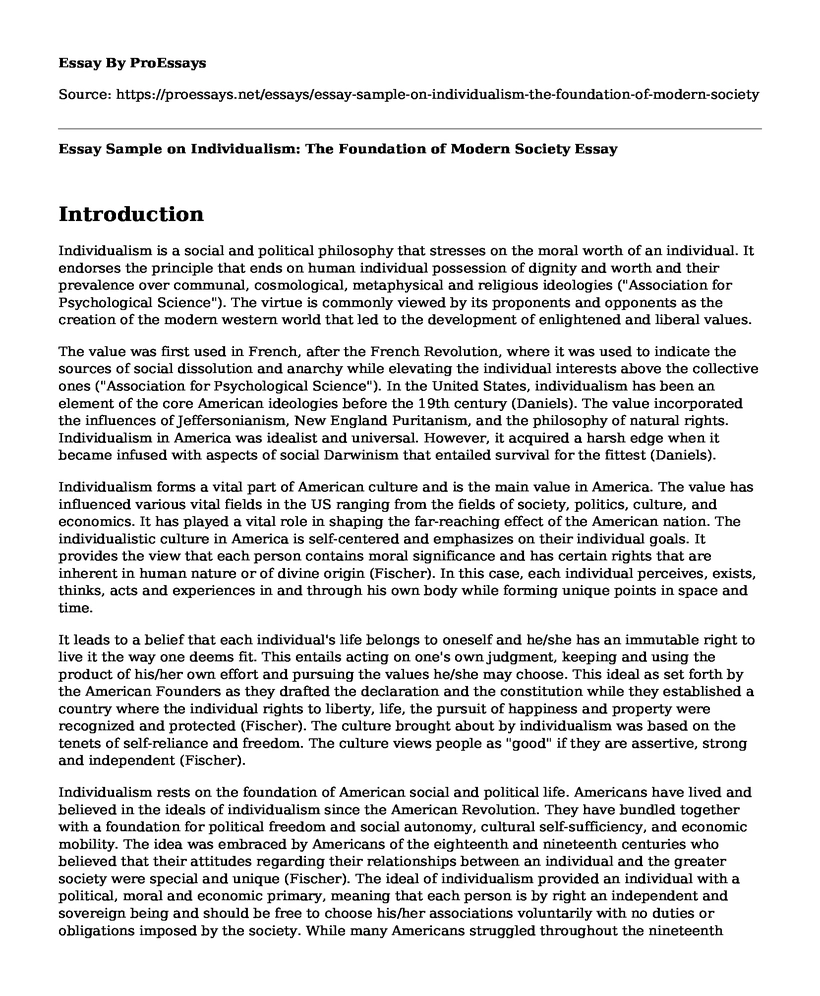Introduction
Individualism is a social and political philosophy that stresses on the moral worth of an individual. It endorses the principle that ends on human individual possession of dignity and worth and their prevalence over communal, cosmological, metaphysical and religious ideologies ("Association for Psychological Science"). The virtue is commonly viewed by its proponents and opponents as the creation of the modern western world that led to the development of enlightened and liberal values.
The value was first used in French, after the French Revolution, where it was used to indicate the sources of social dissolution and anarchy while elevating the individual interests above the collective ones ("Association for Psychological Science"). In the United States, individualism has been an element of the core American ideologies before the 19th century (Daniels). The value incorporated the influences of Jeffersonianism, New England Puritanism, and the philosophy of natural rights. Individualism in America was idealist and universal. However, it acquired a harsh edge when it became infused with aspects of social Darwinism that entailed survival for the fittest (Daniels).
Individualism forms a vital part of American culture and is the main value in America. The value has influenced various vital fields in the US ranging from the fields of society, politics, culture, and economics. It has played a vital role in shaping the far-reaching effect of the American nation. The individualistic culture in America is self-centered and emphasizes on their individual goals. It provides the view that each person contains moral significance and has certain rights that are inherent in human nature or of divine origin (Fischer). In this case, each individual perceives, exists, thinks, acts and experiences in and through his own body while forming unique points in space and time.
It leads to a belief that each individual's life belongs to oneself and he/she has an immutable right to live it the way one deems fit. This entails acting on one's own judgment, keeping and using the product of his/her own effort and pursuing the values he/she may choose. This ideal as set forth by the American Founders as they drafted the declaration and the constitution while they established a country where the individual rights to liberty, life, the pursuit of happiness and property were recognized and protected (Fischer). The culture brought about by individualism was based on the tenets of self-reliance and freedom. The culture views people as "good" if they are assertive, strong and independent (Fischer).
Individualism rests on the foundation of American social and political life. Americans have lived and believed in the ideals of individualism since the American Revolution. They have bundled together with a foundation for political freedom and social autonomy, cultural self-sufficiency, and economic mobility. The idea was embraced by Americans of the eighteenth and nineteenth centuries who believed that their attitudes regarding their relationships between an individual and the greater society were special and unique (Fischer). The ideal of individualism provided an individual with a political, moral and economic primary, meaning that each person is by right an independent and sovereign being and should be free to choose his/her associations voluntarily with no duties or obligations imposed by the society. While many Americans struggled throughout the nineteenth century to throw away Europe's old traditions and frame their own social and cultural institutions that are in line with their political individualism, the wider implications of the value cemented the visions of social cohesion and collective good.
Works Cited
"Association for Psychological Science". "Individualistic Practices And Values Increasing Around The World." Association for Psychological Science, 2017. Accessed on www.psychologicalscience.org/news/releases/individualistic-practices-and-values-increasing-around-the-world.html
Daniels, E. A Brief History of Individualism in American Though. In: Forsyth D.R., Hoyt C.L. (eds) For the Greater Good of All. Jepson Studies in Leadership. Palgrave Macmillan, New York, 2011. doi.org/10.1057/9780230116269_5
Fischer, C. Paradoxes of American Individualism. Sociology.berkeley.edu, 2008. https://sociology.berkeley.edu/sites/default/files/faculty/fischer/Fischer_Paradoxes%20of%20Individualism_2008.pdf
Cite this page
Essay Sample on Individualism: The Foundation of Modern Society. (2023, Jan 28). Retrieved from https://proessays.net/essays/essay-sample-on-individualism-the-foundation-of-modern-society
If you are the original author of this essay and no longer wish to have it published on the ProEssays website, please click below to request its removal:
- Lost City Of Atlantis
- Critical Essay on Our Kids: The American Dream in Crisis
- Ethics and Critical Thinking: The Stanford Prison Experiment
- Free Will: A Contested Concept in Human Lives
- Exploring Identity: Adolescents Searching for Peer Approval - Essay Sample
- A Moral Society: How Religion Provides Direction - Essay Sample
- Essay Example on City Managers: Ensuring Economic Development Amidst Population Growth







